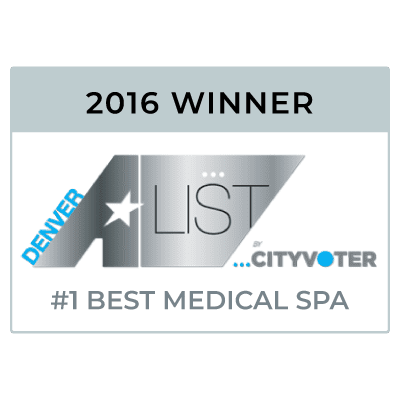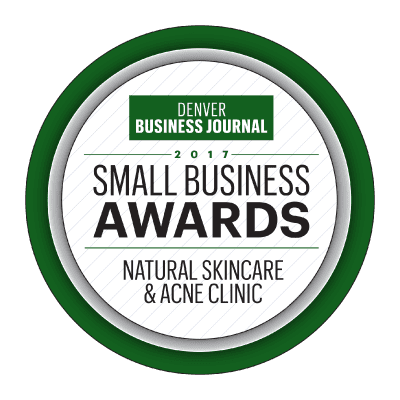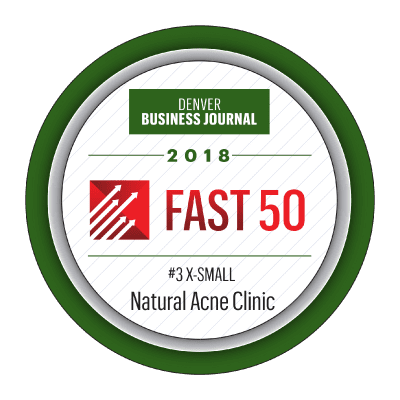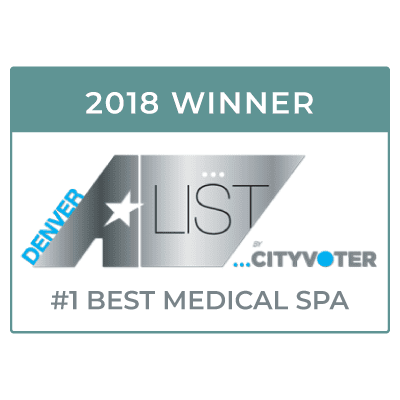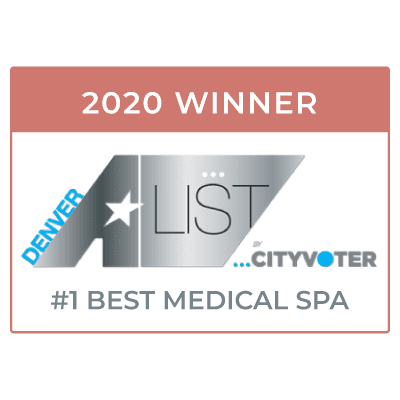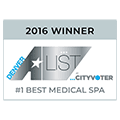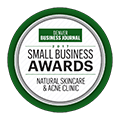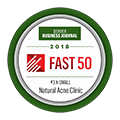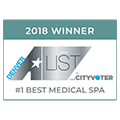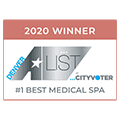No products in the cart.
Hormonal acne treatment. It’s something you’re supposed to grow out of. Like awkward teenage crushes, boy bands and report cards…
Contents
- What is hormonal acne?
- What’s causing my hormonal acne?
- What are the signs of hormonal acne?
- Why is it so hard to clear my skin?
- How do I treat hormonal acne?
- Help! I’ve got more questions
Good grief, hormonal acne? Still? So not fair!
Hormonal acne. It’s something you’re supposed to grow out of. Like awkward teenage crushes, boy bands and report cards.
But here you are. An adult. Still breaking out like a pizza-lovin’ 15-year-old off to the school dance.
Only now, the stakes are higher.
You’d give anything to look your best for that job interview you’re lusting after. Or to “meet the parents.” Or for a big date with the hottie you adore.
Heck, just going anywhere with a clear, smooth complexion would be amazing.
It’s not like you don’t try.
From raiding drugstores and binging online for the latest and greatest products, to downing pills and supplements, you’ve tried every hormonal acne treatment out there.
But so far, nothing’s worked. And the pain and stress of embarrassing breakouts are holding you back from all that you want in life.
Does any of this sound familiar?
Are you thinking “Okay, great, you’ve just described me. I wanna figure this out and I’m so tired of all the BS promises out there. And yeah, sure, I’m dying to have clear skin. So would you please just point me in the right direction?”
I’m so happy you asked. Because that’s exactly where we’re heading next.
Whether you’re a teenager despairing over your bumpy complexion, whether you get monthly breakouts or an increase in breakouts with your periods, or whether yohormonu’re on birth control pills to manage your acne…
You’re in the right place.
There are REAL answers to your questions inside Hormonal Acne: What You Must Know If You Want Clear Skin.
“What is hormonal acne?”
Let’s separate fact from fiction – Just what is acne?
It seems so obvious, doesn’t it―your acne is caused by your fluctuating hormones. Afterall, you can see the evidence as plain as the undulating blemishes on your face.
And if ONLY you could get those darn hormones under control―poof! No more acne.
Which probably explains why you’ve been so willing to invest your money and time in hormone balancing supplements, birth control pills and diet plans.
And I get it. I really do.
Especially since thousands of women who come my way start the conversation with “Help! I’ve got hormonal acne. Can you help me?”
What they didn’t know at first―and maybe you don’t either―is this.
Though fluctuating hormones can trigger your acne…
And a healthy hormonal balance can help improve your skin…
Acne is NOT a hormonal condition. Acne is a genetic skin condition called retention hyperkeratosis.
Let me explain.
Your skin sheds a layer of dead skin cells each day. However, this continuous shedding process goes amiss in people with acne. Acne-prone skin produces up to 5x more dead cells than normal, causing a traffic jam, because the excess dead cells stay stuck on the skin’s surface and clog your pores. The resulting plug, mixed with oil, forms a blackhead. When infected with bacteria, a blemish occurs.
Essentially, your acne-prone skin is perpetually clogging itself. And your unique blend of triggers (more on that later) aggravates and worsens an already faulty situation.
That’s why the myth of “all I have to do is balance my hormones and I’ll get rid of my acne” is so dangerous. It’s a false premise.
I realize this might be a bit hard to digest or believe. Afterall, you’ve probably been on the receiving end of misinformation for eons.
But no worries, help is here and you’ll get your questions answered.
Ready? Let’s take a peek at WHY your hormones trigger your acne and the 6 common pathways.
“What’s causing my hormonal acne?”
The 6 hormonal-related triggers messing up your skin.

When it comes to hormones triggering your acne, you can thank your androgens.
Though androgens are commonly thought of as male hormones, both men and women have them. They’re produced by your adrenal glands as well as the testes and ovaries. The most well-known androgens are testosterone and its breakdown product, dihydrotestosterone (DHT).
How do androgens trigger acne?
If you suppress estrogen―for example, when you take the wrong hormone balancing supplements or lo-dose birth control pills―androgen production goes up. That’s because estrogen and androgens work like a teeter totter; as one goes up, the other goes down.
Here’s the problem. Androgens can bind to oil gland cells in the skin, signaling the oil gland to produce more sebum. This excess oil combines with dead skin cells, debris and bacteria in your pores and causes pimples to form. The more androgens, the more breakouts. And the more you sabotage your skin.
So frustrating! Especially when you thought you were doing the right thing.
What are the primary pathways hormones can mess up your skin? Here are the top 6:
1. Lo-dose birth control pills. Lo-dose birth control pills (along with IUDs and morning after pills) lower estrogen, and in turn elevate androgen levels. To prevent escalation in your acne, it’s critical you speak with your doctor about selecting a form of birth control that is higher in estrogen and lower in androgen potency.
2. Polycystic Ovarian Syndrome (PCOS). Some women are genetically predisposed to high androgen levels, and low estrogen and progesterone levels. This hormonal imbalance causes them to skip menstrual periods and, instead of their ovaries releasing eggs, tiny small, fluid-filled sacs cysts are formed. Research indicates that a high percentage of women are unaware they have the syndrome.
3. Stress. Over-worked, over-committed, stressed out? There’s actually a confirmed link between stress and acne…When you keep putting off opportunities to relax and recharge, your body can enter a constant hormonal state of “fight or flight”, which is controlled by the adrenal glands. Chronic, continual stress increases androgen and cortisol levels, and both can lead to an increase in oil production―and acne.
4. Menstruation. Ever notice your skin getting worse a week before your period? During the latter part of the luteal phase of menstruation, if the released egg doesn’t become fertilized, estrogen and progesterone drop, which causes the onset of your period. These shifts in hormones in turn, trigger acne, albeit the exact sequence isn’t entirely known (Are you noting the recurring theme here?)
5. Pregnancy. Acne during pregnancy is more common than you think! In fact, about half of all women get pimples instead of a pregnancy “glow” during the first and second trimesters. It’s typically related to escalating levels of hormones, including progesterone, which can also increase production of sebum in the skin’s oil glands.
6. Puberty. Whether you’re a girl or boy, when you hit puberty, androgens take off. For girls, typically at about 13, spots and bumps began bubbling up on the forehead. By 15, acne appears on their cheeks, chin and jaw, becoming inflamed along the way. Boys tend to get acne all at once when they’re about 16, due to a big spike in testosterone. And, as you now know, a spike in androgens is responsible for a spike in sebum production―and acne.
Now that you’ve got a handle on the primary hormonal acne triggers, how do you recognize the signs in your skin? Let’s take a peek.
“What are the signs of hormonal acne?”
The 5 Signs your hormones are triggering your breakouts.
Do you suspect that fluctuating hormones are triggering your acne? Here are five primary signs to look for as you play detective:
1. Acne along your jawline, chin and back. One telltale sign that hormones are triggering your acne is the location. When your back, or your chin and jawline are flush with constant or recurring acne, chances are good hormones are one of your primary acne triggers.
2. You’re no longer in your teens. According to the American Academy of Dermatology, dermatologists are finding that adult-onset acne is becoming increasingly common in women in their 30s, 40s and even 50s. Studies show that up to 51% of women in their 20’s, 35% in their 30s and 25% of women in their 40s struggle with acne.
So whether you’ve been experiencing acne since puberty, or just now experiencing it for the first time, you can bet there’s a hormonal component. And as you’ve seen, the triggers can range from a cyclical connection to your period, to stress to pregnancy and more.
3. Acne recurs once a month. Do you track your breakouts? Here’s what you might notice: that your skin is calm for two to three weeks. Then (during the latter part of your luteal phase), breakouts occur for 7 to 10 days prior to your period, but not during. Alternatively, if you always have acne breakouts, you might see a surge in flare-ups in this same cyclical manner.
4. Tender or painful acne nodules. Unlike blackheads and whiteheads, which come to a head, an acne nodule (commonly referred to as a cyst) appears as a bump the size of a pencil eraser under your skin. The nodules almost always start off red due to inflammation, inflamed, and usually last for a couple of weeks.
5. Stress. Guess what? The oil gland cells that produce sebum also have receptors for stress hormones like cortisol and adrenaline. That’s why, in times of heightened or prolonged stress, you break out. And, unfortunately, both psychological and physical stress can have a similar effect. Whether your cramming for exams, trying to get pregnant, getting crushed at work, kids driving you crazy―whatever the situation, stress ups your risk for acne.
Terrific, you’ve got the what, the how and signs of hormone-triggered acne. Now, why has it been so hard to get rid of?
“Why is it so hard to clear my skin?”
What doctors, bloggers and skincare companies forget to mention.
Have you ever tried to use a hormonal acne treatment―such as a single hormonal rebalancing supplement or birth control pill―and failed?
It’s not your fault.
Here’s the critical piece of info you need that the pros left out. Either because they don’t know what I’m about to share or don’t understand the true nature of acne.
A one-product or one-med at a time approach will not eliminate your acne.
Think back. How many products, meds or treatments have you tried, one after another, hoping “This will be the one!”? Only to be disappointed when it wasn’t?
Here’s the thing…
Many acne triggers―including certain foods, stress, pore-clogging ingredients, ineffective skincare regimens and more―can aggravate and perpetuate your acne. And fluctuating hormones are just ONE of many possible triggers that you may be susceptible to.
That’s why a one-hit wonder supplement, potion or drug can’t possibly address the broad range of diverse, direct attacks on your skin. They’re not designed that way.
Instead, it’s critical that you examine ALL the possible ways your skin is susceptible, and treat your acne with a WHOLE-BODY approach.
That way, all your good efforts in one realm aren’t offset because you didn’t realize you needed to address another two or three triggers threatening from a completely different quarter.
For example, you could be using the perfect hormonal rebalancing supplement, but you’re still breaking out. How would you know if it’s working or you need to ditch it? What if, unaware of the danger, you’re also (1) eating foods triggering flare-ups and (2) using shampoos, lotions and makeup that are clogging your pores? How do you figure out the acne-triggering culprits? Until you take a whole-body approach to acne treatment, it’s going to be hard to achieve clear skin.
Do you see that treating acne successfully isn’t a “one and done” magic pill or product approach? That treating your fluctuating hormones is only part of the answer?
Now that you have this critical awareness, let’s move on to how you can successfully treat your acne to get healthier skin.
“How do I treat hormonal acne?
3 Pathways to healthier skin.
Great! So far in Hormonal Acne: What You Must Know If You Want Clear Skin, you’ve learned that:
- Fluctuating hormones trigger your acne; they’re NOT the root cause of your acne.
- Elevated androgens are the most common hormone-related acne culprit, followed by stress hormones.
- There are 5 signs to detect if fluctuating hormones are contributing to your acne woes.
- It takes a comprehensive, WHOLE BODY approach to heal and eliminate acne; rebalancing your hormones is just one important avenue!
With these lessons in mind, let’s tackle how you can start getting hormonal acne triggers under control.
Treatment Strategy #1 ― Herbs and supplements. Here are four of my client-tested and proven favorites :
Vitex. Also known as agnus castus or Chasteberry Vitex has been used for centuries as a “woman’s herb” to help relieve PMS, mood swings and anxiety. Vitex works with the pituitary and hypothalamus glands by increasing the production of luteinizing hormone and inhibiting the release of follicle stimulating hormone. This helps bring levels of estrogen, progesterone and testosterone back into harmony faster than what your body could do on its own.
Fish oil (and flaxseed oil). Fish oil is rich in Omega 3 fatty acids, which acts as a natural anti-inflammatory. Since inflammation is at the core of acne, taking fish oil with high levels of Omega 3’s is one of the best things you can do for your skin. The essential fatty acids soothe your body’s inflammatory response to excess sebum and bacteria, and help reduce the action of PGE2 and LTB4―two inflammatory chemicals that are responsible for acne breakouts. What’s more, Omega 3 fatty acids help regulate the action of acne-causing hormones, such as testosterone and androgen, which, as you know, contribute significantly to acne breakouts.
Saw palmetto. Saw Palmetto is a small palm with fan-shaped leaves and sharply toothed stalks, native to the southeastern US. Supplements made from the berries are used to decrease inflammation and are found to decrease the uptake of testosterone in the body. These effects are likely attributed to natural anti-androgenic effects, which block the actions of testosterone in the body, which in turn can help reduce acne breakouts for women and men.
Adrenal formula. An adrenal formula―containing, for example, Borage, Holy Basil (Rama), Gotu Kola, Bugleweed, Shizandra Berry and Jujube Fruit―is a powerful way to strengthen, support and rebuild the adrenal glands, which deal with stress and stimulate the hormonal response needed to deal with the situation. When one has high anxiety, is in conflict, facing deadlines, emergencies or has trauma, an adrenal formula like this helps repair your over-worked and burnt-out adrenal glands.
Treatment Strategy #2 ― Expert esthetician. When it comes to achieving enduring clear skin, it’s critical to address hormonal and other imbalances in your body, and identify other triggers aggravating your acne. However, sometimes, you need the immediate attention of a professional to accelerate the process.
Depending on your skin sensitivity and type of acne, an expert esthetician can help you select appropriate options including:
- Chemical peels, to gently kill bacteria, reduce oil production, reduce inflammation, and improve discoloration and acne scarring.
- Extractions to remove blackheads, comedones, whiteheads and pustular acne.
- Natural, safe and effective skin care products and regimens to reduce inflammation and speed healing
Treatment Strategy #3 ― Stress reduction. If left unchecked, stress can cause or increase breakouts. Which in turn lead to even more stress. Which in turn leads to more acne. A vicious cycle indeed. How can you relieve stress so you can calm your skin and alleviate your acne? Here are a few of my favorite go-tos. Try one or try them all! You’ll do your skin―and your mind, heart and body―a world of good.
- Breeeeeathe. Controlled breathing helps lower pimple-producing stress hormones like cortisol. Any time you feel stress escalate, take a deep breath in for 5 seconds, hold for 5 seconds, breathe out for 5 seconds. Repeat until you feel calm.
- Exercise. Exercise pumps up your feel-good neurotransmitters (your endorphins) which raise your optimism, energy and mood. Exercise—in almost any form so take your pick!―can also improve your sleep, lower the symptoms of anxiety and mild depression, and give you a sense of control over life.
- Laughter. A good laugh can stimulate your intake of oxygen-rich air, stimulate your heart, lungs and muscles, soothe tension and increase endorphins released in your brain. Laughter has long-term benefits too! It can improve your immune system, relieve pain, increase personal satisfaction and improve your mood.
“Help! I’ve got more questions.”
FAQs―you ask, we answer!
We’ve covered a lot of ground in Hormonal Acne: What You Must Know If You Want Clear Skin. And yet, you may still have more questions. That’s great! That means you’re serious about clearing your skin.
To help you make the best decisions for your skin, here are eight FAQs and answers to speed you on your way.
- FAQ #1 ― What is hormonal imbalance?
Hormones are chemical messengers, sent through your bloodstream, to tell your tissues and organs what to do. Hormones are produced by glands in the endocrine system, which is in charge of all hormone production, and includes feedback loops to modulate hormone release to maintain balance.
Hormones regulate a wide range of bodily systems including heart rate, sleep cycles, growth and development, body temperature, metabolism and appetite, reproductive cycles and sexual function, and mood and stress.
When you become ill or have a poor diet which impacts your gut health, or experience stress or trauma, or sleep poorly, or take steroids, your hormones can become imbalanced and you can experience a wide range of undesirable symptoms, including acne.
- FAQ #2 ― What hormones cause acne in females? For women, the two most common hormones triggering acne are:
1. A lowering of estrogen and related boost in androgens; androgens bind to cell receptors in your sebaceous gland, signaling it to produce more sebum. This excess oil combines with dead skin cells, debris and bacteria in your pores and causes pimples to form. You see the results with skin irritation, redness—and elevated breakouts.
2. When you’re experiencing elevated, prolonged or chronic stress, your level of cortisol jumps. This “fight or flight” hormone can also bind to cell receptors in the oil gland and, like androgen, cause an uptick in oil production, which can lead to more breakouts.
- FAQ #3 ― What is the best hormonal acne treatment method?
Here’s the most important thing you should know: Successfully treating acne requires a WHOLE BODY approach. Hormonal imbalances are just one trigger that may be aggravating your acne. Other primary triggers include certain foods, gut imbalance, pore-clogging ingredients, and ineffective skincare regimens and products.
That being said, a blend of safe hormonal supplements, visits to an expert esthetician and daily stress relief practices―and identifying and addressing ALL your acne triggers―is the best path to clear skin.
- FAQ #4 ― What is an effective hormonal acne treatment without birth control?
Whether you want to start a family, try a different method or concerned about prolonged use, going off the pill can cause major changes to your body—and skin, so it’s important to understand the link between birth control and acne treatment.
Yes, your chances of acne go up when you stop the pill, but there are safe ways you can counteract this situation
- Avoid iodine and eat more fruits and vegetables, especially one high in antioxidants.
- Take skin-enhancing herbal supplements like Vitex.
- Protect your gut flora with a potent probiotic supplement containing a mix of lactobacillus and bididobacterum―two know anti-acne beneficial bacteria.
- Start a consistent skin care routine using non-pore-clogging ingredients, to remove excess oil, keep pores clear and speed healing of any existing blemishes.
- Avoid stress! And use stress-reduction techniques like deep breathing, exercise and laughter.
- FAQ #5 ― What foods help with hormonal acne?
Freshwater fish and flaxseed are two foods that offer Omega 3 fatty acids, which are shown to reduce inflammation as well as regulate acne-triggering hormones like testosterone and androgen. In addition, plant-based foods high in antioxidants may also help reduce inflammation and promote clearer skin. Again, however, it’s critical you take a whole-body approach to healing and clearing your skin.
- FAQ #6 ― What foods make my hormonal acne worse?
This is a really big topic! And we’ll be covering it in detail in future posts. For now, your top-of-the-list food to avoid? Iodine. Seafood, shellfish, seaweed, iodized salt (sea salt is fine), sports drinks and fast food all contain high amounts of iodized salt. In particular, we know there is a strong relationship between dairy and acne. Note too, that supplements and medications for thyroid support, such as iodine and kelp are also contraindicated if you are acne-prone.
- FAQ #7 ― What age does hormonal acne stop?
Unfortunately, fluctuating hormones can trigger your acne throughout your life. It’s common for girls and boys to experience acne beginning with puberty (for some, it even starts in the preteen years). And many women and men continue to experience acne throughout their adult years. For example, women are increasingly experiencing acne in their 20s, 30s, 40s and 50s. And during perimenopause and menopause, and beyond.
- FAQ #8 ― Is there a natural way to treat my hormonal acne?
YES! The first step is (1) identifying all your possible acne triggers; e.g., hormonal imbalances, gut imbalance, diet, pore-clogging ingredients and ineffective skincare products and regimens. Once you identify your unique blend of triggers, then you can (2) implement a safe, powerful plan that addresses all triggers, and choose safe, effective skincare products and regimens that guide you to clear skin.
Parting Words
Here’s what you need to remember:
Although a hormonal imbalance may be triggering your acne,
and you may have been dealing with this situation for years,
once you pinpoint ALL your potential acne triggers,
and use a whole-body approach to treat your acne,
you’ll be on the right path to enduring clear skin.
Use this new awareness and the suggestions you’ve gleaned to take a fresh look at your situation.
A great way to start? Take action.
Rather than just read and set this information aside, when you take action, you can start making forward momentum in your skin healing journey. It’s the best way to enjoy lasting benefit from all you’ve just learned.
And taking action can be as simple as heightening your awareness about the impact of hormones on your acne, by answering these questions:
- Do you think hormones may be triggering your acne?
- If so, what do you believe might be the primary pathway(s) messing up your skin?
- What signs of hormonal-triggered acne do you identify with?
- Do you suspect there may be OTHER triggers contributing to your acne woes, like iodine-rich foods or pore-clogging ingredients?
What did you discover? Any surprises? When it comes to other potential acne triggers, what do you want to learn about next?
Once you’ve reflected on your answers to these questions, definitely try the suggested treatments for getting any hormonal imbalances under control. That way, you can begin to alleviate that contribution to your breakouts.
And have faith.
You’re absolutely in the right place with our award winning Online Acne Program to put an end to the bewildering confusion and questions you have about your acne. Now, take solid steps forward to your dream of having a clear and beautiful complexion.
